Three biographical pieces on W. B. [Walter Blakesley) Conkey, 1888-1923. The Conkey Commpany to 1890;
Conkey's role as printer for the Columbian World's Exhibition, 1893;
An obituary following his death in March 1923
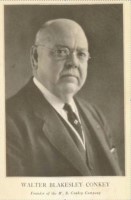
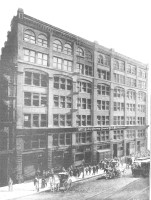
From Chicago and Its Resources, Twenty Years After 1871-1891: "The W. B. Conkey Co., 341-351 Dearborn Street, General Printers and Book Manufacturers, have the most complete establishment in this country for the making of all kinds of catalogues, books, etc., in the shortest possible time; appreciating the fact that to-day Time is the great essential in printing and binding, they have perfected their plant so as to be enabled to turn out the largest editions in an almost incredible short space of time.
In the Composing Room from 80 to 100 compositors are employed. There are many tons of body type, and 300 fonts of display type, embracing all the latest designs, all of which have been purchased new within the last year, and as it is not used for anything but tor electrotyping purposes, it must be always clear, and in good condition
The Press Rooms contain forty cylinder presses, from the perfecting presses which take the paper from the roll and print both sides, to the finest six roller stop cylinder machines used on the highest grades of black and color printing. Immense fire-proof vaults are provided for all book plates and dies. The plates of 3,000 books are kept in these vaults, where they are perfectly secure from fire or accident. The provision made for caring for plates is most ample for years to come.
In the lighting of the printing factory Mr. Conkey having given careful study of the effect light has to color, has overcome the difficulty of lighting press rooms with arc electric lamps, avoiding the variations of color. The press rooms are lighted by over fifty arc lamps of 2,000 candlepower, and make them as bright as sunlight.
The consumption of the press rooms average about fifty tons of paper per day. Some of the presses print as many as 64 pages of an 8vo. at one time. Color work of the highest class and printing of the very finest half-tone illustrations are done on smaller presses containing every one of the latest improvements.
The Bindery is the largest in this country, employing about six hundred people, and equipped with all the modern improvements of the times, consisting of forty-five folding machines, twenty-two wire stitching machines, twenty-four improved book sewing machines, twenty-two cutting machines and twelve embossing machines, besides innumerable rounding, backing, case-making, beveling, round cornering, indexing machines, etc.
This establishment can deliver to their customers 10,000 copies of a book of 400 pages, completely printed and bound, within twenty-four hours from the time the plates are placed in their hands. This Company have two factory buildings, the printing building is 100x100 feet, six floors and basement; the bindery building is 125x70 feet, seven floors and basement. Two fast-freight elevators are required in each of the buildings, and also special conveyors are kept constantly moving with books unbound and bound, carrying them to any part of the bindery.
The printing department is run by two large engines of 150 horsepower, and the bindery department by a Hamilton-Corliss engine of 180 horse-power. Immense batteries of boilers in each supply abundant steam for power and heat.
Both buildings are fully equipped with high pressure automatic sprinklers, mercurial fire-alarms, complete equipment of fire-pails, etc. In addition special watchmen patrol every floor, and register their calls by time clocks, which secure perfect vigilance. As a result of these precautions the rate of insurance is less on this establishment than any similar one in Chicago. Time-clocks are provided for each department, so that each employee registers his own time. Electric call bells and telephones connect every department with the office, so that all parts of the establishment can be reached almost instantly, and are in perfect touch with the guiding head. From top to bottom everything is reduced to the utmost system and regularity. From 800 to 1,000 persons are constantly employed, varying according to the season, the pay-roll ranging from $8,000 to $10,000 per week, with an output of $1,000,000 per annum.
The machinery in each of the several departments are of the very latest improved; in fact, in fitting up the establishment nothing was found to be too good, which saved labor, or contributed to the perfection of the work turned out, and since then whatever improvements in machinery were made in their line have been secured, no matter at what cost.
The W. B. Conkey Company is an Illinois corporation, with a paid-up capital stock of $300,000, of which Mr. W. B. Conkey is President. The concern was started in a small way some fifteen years ago and has had a very healthy and steady growth ever since.
The Printing factory is located at Nos. 65-71 Plymouth Place, and the Binding factory at Nos. 78-88 Plymouth Place. The Printing building was erected some four years ago purposely for a printing building, and has all the necessary requirements for such. The Binding building was also erected some four years ago by and owned by Mr. W. B. Conkey, who built it expressly to meet the requirements of the bindery, being lighted on two sides by wide streets, and the building having a depth of only seventy feet gives it the most perfect daylight throughout for all its workrooms.
This concern prints and binds from the smallest pamphlet to the largest and finest bound book, executing all work in the highest style of art.
The motto of the concern is to be “Always on time,” which, no doubt, has been the key-note to its remarkable success.
Chicago Tribune December 22, 1892: CONKEY IS TO GET IT. / IN ALL PROBABILITY HE WILL PRINT THE BIG CATALOG. / Members of the Board of Directors and the National Commission Practically Agree to Award Him the Concession – Investigating Committee Adopts Resolutions – Something About Conkey’s Career in Chicago – Horace Tucker Appointed Superintendent Bureau of Admissions.
W. B. Conkey will, in all probability, be given the concession for printing the Exposition catalogue. This was practically agreed upon at a meeting yesterday afternoon between members of the Board of Directors and National Commission. The Board of Control of the latter body has the right to finally pass upon the contract for the work. Inasmuch-as the full board has adjourned until Jan. 4, 1893, it was deemed necessary to secure several of its members remain in the city with their consent to the contract, with the belief the entire body would ratify it later on. Mr. Conkey has signed the contract, and yesterday practically gave out that unless he was assured before 6 o’clock that the contract would be his, he would withdraw his proposition. This announcement caused quite a stir among Exposition people, and they were not slow in bringing about a conference of all the parties in interest. As a result, Mr. Conkey and his attorney, ex-Judge Page, left the Rand-McNally Building with every assurance that the concession would go to Mr. Conkey.
As formally winding up all the charges preferred in connection with the investigation of Exposition officials in regard to the concession the Executive at its meeting yesterday adopted a set of resolutions. After telling how the committee was organized the resolutions say:
That the conclusions of your committee, from the heard, are that there is not the slightest basis in fact for any statement, insinuation, or innuendo that any of the members of the Ways and Means committee, or any director, officer or employee of the World’s Columbian Exposition is or has been in the remotest degree, either directly or indirectly, interested in the granting or refusing of any concession either granted or refused by said committee. The members of the entire directory as well as those composing the Ways and Means committee are among the best known and most reputable business men in the city. They give their intelligence and valuable time to the Exposition without fee or reward; and their conduct, as shown by the evidence, is such as to the approval not only of all the stockholders but of every citizen interested in the success of the Exposition.
So apparent was it that the rumors which found expression to some extent in the public press, and which were insinuated in the charges filed with the committee, were wholly untrue, that the members of the labor organizations were satisfied and honorably withdrew all such charges or insinuations.
On consideration of testimony of several of the Ways and Means committee who have had experience for the last eight months in the granting of concessions for the World’s Columbian Exposition, your committee is unanimously of the opinion that it is in many instances not wise to advertise for bids for concessions to be granted for the reason that the asking of specifications for many of the concessions so definite and certain that there could be intelligent bidding thereon is a matter wholly impracticable. But your committee is of the opinion that in the granting of concessions of any considerable importance it would be wise for the committee having it in charge to invite propositions by public or otherwise from persons engaged in the line of trade or business pertaining to the particular. This not so much for the reason of better terms to be obtained, for we are not satisfied that would always be the case, but for the sake of silencing those who might carp at perfectly honest and upright action if such inviting of competition was entirely omitted.
Submitted: EDWIN WALKER,.... THOMAS MORAN,.... MARK L. CRAWFORD.
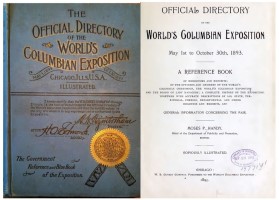
World’s Columbian Exposition, 1893. Official Directory, W. B. Conkey, Printer
Something About Conkey.
So much has been said about W. B. Conkey that public interest has been excited. Twenty years ago there trumped into Chicago a lad of 14 years with little clothing, no money. He was young Conkey. He didn’t Know where to secure a meal, but he Was willing to work. A dry goods firm gave him a position at a nominal salary, which enabled him to secure board and lodging. He didn’t like the position he held and shortly afterwards learned the business of type-setting, beginning in the office of R. R. Donnelley. Mr. Conkey passed through all the gradations of type-setting and graduated the printers’ room to a position as reporter on the morning newspaper then known as the Courier. That publication passed out of existence years ago, but not before Mr. Conkey had passed three years in its service. When he left the Courier he went to the Evening News, then controlled by Melville E. Stone. Mr. Conkey was engaged in the capacity of city circulator for Mr. Stone’s afternoon venture.
In 1877 Mr. Conkey started in a small way a newspaper mailing agency. His office wasn’t a big one and he had to do a great deal of hustling for patronage. His efforts in this necessitated private work in several of the morning newspaper offices. In fact, his busiest time was at 3 o’clock in the morning, when editions of the newspapers were sent out from the city. But Mr. Conkey didn’t like work at 3 o’clock in the morning, and soon started a little book-binding establishment. He called it a book bindery, but that title, however, was far too dignified for the venture. What the proprietor did was to bind certain small pamphlets instead of books. Within a few years be opened a real book-bindery on Dearborn street. While his quarters were comparatively ample for the capital invested, they soon proved to be too small. Not having extensive funds at hand he called in Mr. [Alexander]Zeese [1827-1898], now a Chicago publisher [of German photolithography, engraving, and electrotype founding], and the two erected the Franklin Building on Dearborn street. Mr. Zeese took two floors and Mr. Conkey a like number. But before the bookbinder began in the new establishment he engaged two additional rooms. Later, with the exception of Mr. Zeese, he bought out all the other tenants and took the remaining rooms in the building. Since that time Mr. Conkey has been uniformly prosperous. Two years ago he bought out an entire printing establishment, and a year ago last July purchased another -- the plant of the Illinois Printing and Bindery company.
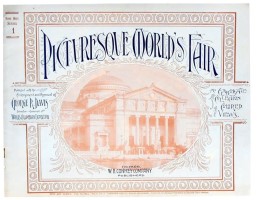
Picturesque World’s Fair an Elaborate Collection of Colored Views, 1894, W. B. Conkey, Printer
Mr. Conkey was born in Sterling, Canada, in 1858. He was one of a family of half a dozen children, and when his father died, leaving the mother to care for the children, he resolved to look out for himself and to reach Chicago. Within twenty years he has experienced all the vicissitudes of fortune and has now secured from the Exposition company a concession which demands $100,000 in cash, a bond for $150,000, a check for another $10,000, and involves the payment of a large percentage of the gross receipts of his venture.
Chicago Tribune, January 6, 1893. CONKEY GETS THE CONTRACT. Preparations Already Underway for Printing the World’s Fair Catalogue.
W. B. Conkey was yesterday given finally the contract for the concession for printing the Exposition catalogue. The papers were signed by President Higinbotham and other World’s Fair officials. Mr. Conkey deposited the check for $10,000, and demonstrated his ability to pay at the proper time $100,000 as a bonus. The catalogue of the World’s Columbian Exposition will be bound in English cloth, and will cost $2.50 per volume. This is for the volume containing all the lists in one book. There will be individual catalogues for each of the twelve great exhibit buildings which may be carried in the pocket. These small books will cost at the rate of 10 cents for sixty-four pages. If they exceed this number an higher price will be charged, and if they fall below it a lower price will be fixed.
The system of designating the location of exhibits is one of letters and figures. Each building will be marked off with lines running longitudinally and latitudinally. The longitudinal lines will be lettered; the latitudinal ones numbered. For instance, if Mr. Smith’s exhibit were designated “P31”, the visitor would first discover the longitudinal line on which it was located and then seek for the intersecting line with the proper number. One feature new to catalogues will be the absence of a single line of advertising as such. The book will be printed neatly and form straightforward reading matter. After the statement of the exhibitor’s name and address and his exhibit there may be additional descriptive matter. This additional matter will be charged for at the rate of $5 per line.
Mr. Conkey, as soon as the contract was closed yesterday, sent out to type founders ordering twelve tons of type. This large quantity was deemed necessary because it is the intention to keep the entire composition “standing.” The matter when put in type will be kept in that form the period of the Exposition. In order to guarantee the safety of the electrotypes ten sets will be made. One set will be stored in the First National Bank, another in a safety deposit vault on the West Side, another will be stored on the North Side, and six sets will be kept in the office of the publisher. The amount of metal that will be used in the electrotypes is estimated at six tons; amount of printing ink required, fifteen tons. The type if “set up” newspaper column width would make a line of metal one mile long. It will require a force of 1,000 people to handle the enterprise. At least forty cylinder presses, perfecting presses with a rate of 1200 perfected sheets per hour. Two hundred carloads of paper will be used in the books. The estimated sale of the volumes ranges from 10,000,000 to 12,000,000.
Maj. Handy of the Department of Publicity and Promotion will be the editor-in-chief of the work. The descriptive matter and everything in reference to the exhibition will be furnished by the exhibiters themselves. This will be procured by means of blanks now being sent out to them for the purpose. This matter upon reaching Chicago will be turned over to Maj. Handy and under his supervision edited and sent to the publisher. Mr. Conkey prints the work, places it on sale, and pays the Exposition company 10 per cent of the gross receipts until they shall reach $500,000. After that he pays 25 per cent of the receipts. In addition to the catalogue concession Mr. Conkey, associated with C. H. Taney of West Virginia, has secured the concession and contract for printing a directory of the Exposition. This directory is to contain a complete list of exhibiters, their home addresses, and the names of their exhibits. It will also embrace a history of the Exposition, cuts of all the buildings, portraits of the leading World’s Fair officials, as well as all the members of the Board of Lady Managers. In addition there will be given the rules and regulations of the Exposition.
This will also be copyrighted and sold at $2.50 per copy."
The Conkey Company, including the Chicago building, was sold to Rand McNally in 1949. The building was converted to lofts in 1983 and named Old Franklin Building. Booth Hansen were the architects.
Manufacturers’ News: A Weekly Journal Devoted to the Industrial .. vol. 23 (March 10, 1923), p4.
In Memoriam
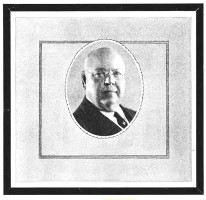
TWENTY-EIGHT years ago a little group of Illinois manufacturers, led by led by Walter Blakesley Conkey, banded together in what is known today as the world's greatest organization of its kind -- the Illinois Manufacturers' Association -- and Mr. Conkey was its first president. For six years he presided over the destinies of this infant association, fighting for it, and with it, in the interests of the manufacturers of the State, until it grew to strength sufficient to stand on its own feet and wage its own battles, the result of a great thought and a great effort on the part of a big man.
Today Walter B. Conkey is dead, stricken in the full period of his strength. The end came suddenly last Monday, March 6, at his winter home in St. Petersburg, Florida, caused by heart trouble. He was born at Sterling, [Ontario] Canada, in 1858, being 65 years old at the time of his death. He was the son of Willard and Emma Tobey Conkey. His great grandfather, Silas Conkey, was a fifer in Col. Woodbridge's Massachusetts regiment in the Revolutionary War. He attended school in Philadelphia and came to Chicago in 1872. Learning the printer's trade, five years later, at the age of 19 years, he established his own publishing business in a modest way in West Monroe Street. Later he moved to South Dearborn Street, where he occupied two 8-story buildings and had more than 1,500 employes. In 1898 he moved his entire plant to Hammond, Ind., where he erected a model establishment, one of the largest of its kind in the country -- a series of one-story buildings on a tract of 40 acres, with parks about the buildings and clubrooms for men and women employes, lunch rooms operated on a less than cost basis, and many other comforts and conveniences less common in those days than at present.
Mr. Conkey's Family
Mr. Conkey's last illness was short. About three weeks ago his heart began to trouble him, and his son, Henry P., went to St. Petersburg to be with his father and mother. Favorable reports were received in Chicago of his condition until last Monday, when he was fatally stricken and died suddenly.
Mr. Conkey is survived by his widow, Mrs. Kate Phillips Conkey, two sons – Henry P. of Chicago and Walter B., Jr. of New York – and one daughter, Mrs. Frank B. Winans of Chicago. The body will be placed in a vault in St. Petersburg until Spring. Services will be private. No further arrangements have yet been made by the family. Mr. Conkey was a member of many clubs and fraternal organizations, among them being Sons of the American Revolution, Society of Colonial Wars, Union League Club, Chicago Athletic Association, Press Club of Chicago and the Masons.
As the original advocate of the open shop, Mr. Conkey was the leader in the fight against union labor that led to the organization of the Illinois Manufacturers' Association and the lining up at that time of that Association in opposition to labor. For many years he carried on this battle, advertising extensively the fact that his printing place was non-union. Fifteen years ago, however, he unionized his big Hammond plants.
Many years ago, during the heat of the battle with the unions, Mr. Conkey, then President of the Illinois Manufacturers' Association, outlined the policy of the organization, a policy it has ever since followed, when he said:
"The Association has proceeded upon the theory that there are always enough honest men in the legislature to prevent the passage of any unjust or vicious measure providing the unfavorable features of a bill under consideration are properly brought to their attention. Harmful bills very often drift through unnoticed because, apparently, they are all right, but when examined are found to be exceedingly dangerous. Our mission seems to be to watch for these bills, and whenever one is found to properly point out its weak and vicious features."
Gift to Mr. Conkey
These words of Mr. Conkey might well have been spoken today, for legislation threatening and imposing unreasonable burdens on industry is just as common now as it was twenty odd years ago when Mr. Conkey made the above statement.
At the Silver Jubilee anniversary -- the 25th annual convention -- of the Illinois Manufacturers' Association, held last December, the Association honored its first President with a gift symbolizing in concrete form the gratitude and appreciation of the organization for the work he had performed for it during all the years of his connection with it. The gift was a Paul Revere bowl in silver. The presentation speech was made by Colin C. H. Fyffe, General Counsel of the Association, and in the course of his remarks, he said:
"Twenty-eight years ago this baby was born, and it had a mother and father, godmother and godfather, and sponsor, and almost everything combined in just one person; and its father and mother and godmother and so on, watched over the child until it grew to be a youth, and finally got to be the biggest thing of its kind in the world, and the sponsor, father and mother and so on, was our dear friend, Mr. Walter B. Conkey."
Mr. Conkey, taken completely by surprise, said in response:
"This is a very proud night for me and it is with pardonable pride that I think of the honor of having been the first President of this organization.'
[Proceedings of the ... annual convention Employing Bookbinders of America 4th (1923) PROCEEDINGS OF THE FOURTH ANNUAL CONVENTION HELD IN WASHINGTON, D. C. OCTOBER 22ND, 23RD AND 24TH, I923 AT THE HOTEL HAMILTON General Offices, 141 Broadway; New York, N. Y. ] p32 -- The next item is the report of the Auditing Committee, Mr. Horace L. Rutter, Chairman. Mr. Rutter is not present but Judge Ommen has his report and will read it.
Judge Ommen : Mr. Chairman, since our last annual convention this Association has lost one of its most valued and earnest members, and it seems to me that this moment might best be taken to say a word and we can then continue with the program. Last year, you will remember the splendid and brilliant address that was given by Mr. W. B. Conkey. He had come into this Association and was one of its most enthusiastic workers and at St. Louis made the speech that really put the whole plan over. His activity and his earnestness had endeared him to everybody. He was a man of rare character and attainments and he built up and developed one of the largest bookbinderies in the world. Every one liked him. Everyone loved him. And his death was a matter of gravest and sincerest regret. I suggest that we all rise a moment and bow our heads in memory of Mr. W. B. Conkey."
(All the members present rose and bowed their heads). When they were seated Mr. Henry P. Conkey said) : / Judge Ommen and Gentlemen, I cannot tell you how much I appreciate this. I know I miss him as much as anyone could. You all know what he was to me and how dearly I loved him, and I assure you that I appreciate this action at this time.
Last revised: 3 December 2022